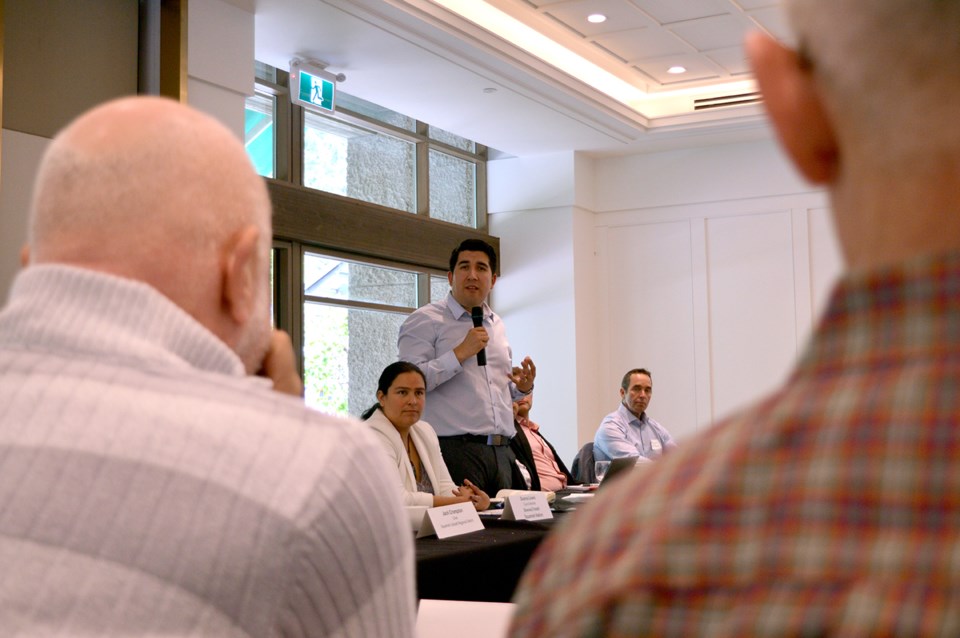Development, environmental initiatives and regional strategies were some of the highlights at the Howe Sound Community Forum.
During the event, which took place on May 4 at the Furry Creek Golf and Country Club, some of the most significant players in the region assembled to compare notes and trade ideas.
The delegation included members from local governments, including the Squamish Nation, Squamish-Lillooet Regional District, Bowen Island, the Sunshine Coast and the District of Squamish, among others. Scientists, developers, industry, and conservationists also attended.
Vancouver developer Michael Geller was on hand to provide a peek into the extensive Furry Creek golf course development.
Fine Peace Holdings, the company that bought the property last year, is expected to bring a proposal for hundreds of housing units to the SLRD in the next few months.
“We think the better approach might be to take a lesson from what we’re seeing in other places where you begin to cluster the housing; you preserve more open space; we also need to address new higher flood-proofing standards,” Geller said.
He added the project is contemplating apartment-type units and that environmentally-friendly housing will be a consideration.
“I think as this development proceeds, we’re going to see more emphasis on passive house standards, we’re going to see performance with Step codes,” Geller said, referring to the optional provincial environmental code.
He said the homes are intended to attract a broader clientele than just investors, though he didn’t make any promises on affordability.
“Whether we can achieve a level of affordability here that I think a lot of people are looking for — I’m not going to pretend that we will be striving for that,” he said.
When asked about firefighting services to the area, Geller said that would be covered by the Britannia Beach Volunteer Fire Department.
Also at the meeting were representatives from the Ministry of Forests and Squamish Nation-owned Sqomish Forestry. Both provided overviews of how they operate.
Jeff Fisher, president of Sqomish, talked about the importance of sustainable logging that preserves animal habitat.
The Sea to Sky Clean Air Society was also present to put out a call for assistance.
Chair Peter Frinton and board member Eric Andersen said that society was facing challenges of dwindling funds and staff.
“What happens to the Sea to Sky Clean Air Society will primarily be determined by you, the member local governments,” said Andersen, addressing the crowd.
There were several options, he said.
Either make it a forum for regular discussions between government, industry and the public, or revert it to an air quality co-ordinating committee.
The latter would require steady financial commitment though, he said.
The last option would be to disband the society altogether, but this would mean no-one would uphold the air quality management plan, Andersen said.
Conservation and marine strategy was also a topic broached by a number of speakers, including representatives from the District of Squamish, the Ocean Watch Task Force, Ocean Wise and the David Suzuki Foundation.
Squamish Nation Coun. Chris Lewis advocated for co-ordination between the Nation and the District of Squamish.
He said it would be best for the District of Squamish to consult the Nation as the municipality drafts its Marine Action Strategy, so both could work together on the items addressed in the plan.
The strategy focuses on local marine issues such as tourism, unauthorized mooring, and ship-source pollution.
One of the presenters, Bonny Brokenshire, manager of parks and environment for Bowen Island, had a lot to say about an issue many Squamish residents care about — derelict boats.
She said she has taken GPS co-ordinates of these vessels in her municipality and created a database that would allow authorities to keep track of those boats.
“I’d love that to be a model for all the jurisdictions around Howe Sound where we can share information and share GIS data,” she told The Chief in an interview. “It would be nice to be standardized so it could be shared.”
One of the goals of the Ocean Watch Task Force would be to have local governments in Howe Sound pool their information on derelict vessels and create a shared database, Brokenshire said.
“We’ll be working now over the next two years... to bring this to reality where all jurisdictions have inventories that are easily shared,” she said.
The Ocean Watch Task Force is a group that was borne out of the Ocean Watch report that was spearheaded by the Vancouver Aquarium’s Ocean Wise program.
A Fisheries and Oceans Canada representative was also on hand to talk about glass sponge reefs in the Howe Sound area that have recently been found to be “ecologically significant,” meaning that they provide habitat for animals.
Local politicians such as MLA Jordan Sturdy, MLA Nicholas Simons, and SLRD chair Jack Crompton were also present to discuss regional trends, such as the steadily growing population in the area.
Finally, members of each community in the Howe Sound area provided brief updates as to what was happening in their respective communities.




